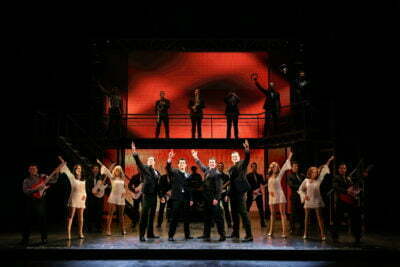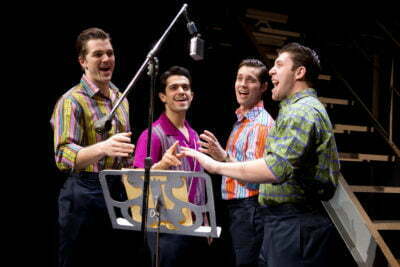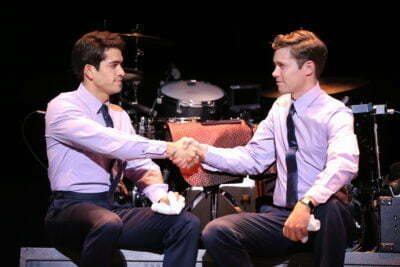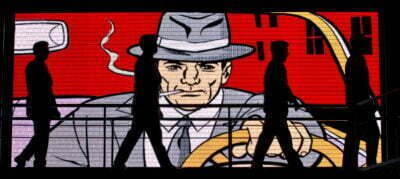Jersey Boys (National Tour, 2015)
Book by Marshall Brickman and Rick Elice
Music by Bob Gaudio
Lyrics by Bob Crewe
Directed by Des McAnuff
Produced by Broadway in Chicago
Jersey Boys a Rousing, Fun Time
Chicago musical lovers may rejoice at the return of Jersey Boys, winner of the 2006 Tony Award for Best Musical. The second national touring production, last here in 2012, consists of energetic singers and dancers with lovely voices performing the hits of Frankie Valli and the Four Seasons, one of the last popular pre-Beatles groups. Jersey Boys even manages to make the story of the group’s formation, rise to fame, and dissolution a fulfilling drama in its own right, a welcome bonus for a jukebox musical.

The story is told through alternating narrations by the four band members. It begins in the mid-1950s, when Tommy DeVito (Matthew Dailey), a young man in an Italian neighborhood in New Jersey, created a band with his brother Nick and friend Nick Massi (Keith Hines) in between break-ins and time in prison. One day, he takes notice of a teenager with an amazing falsetto, Frankie Castelluccio, called Valli (Hayden Milanes, alternating some performances with Miguel Jarquin-Moreland), and recruits the boy into the band. Valli also nearly gets roped into DeVito’s criminal way of life, but encounters a merciful judge, and a mafia captain who appreciates him for his voice. After DeVito’s brother leaves the band, the Four Lovers, as they are known, struggle with alternating members and weak tours. After several years, Valli encounters the teenage one-hit wonder Bob Gaudio (Drew Seeley), identifies with him, and brings him onboard. With the aid of Gaudio’s songwriting talent and business instincts, the band improves enormously.

Finding a recording studio proves to be problematic, however, and The Four Seasons, as they are now known, spend a year as back-up performers in the studio of Bob Crewe (Barry Anderson). Fearing for the future of the band he manages, DeVito takes out large loans from the mob in addition to what he already owes. In 1962, Gaudio finally comes up with a major hit, Sherry, and the group is one their way to stardom. Ambitious and clever, Gaudio convinces Valli to join him on an independent partnership, not something that would detract from the band, simply but work alongside it. Valli by this time regrets the time he is spending away from his family, and is increasingly irritated with DeVito, the band’s ostensible manager, who does not change his behavior to match the group’s vastly increased exposure and contractual obligations. When the mob finally calls DeVito’s debts, The Four Seasons reach a point of crises of loyalties, as Gaudio was more Valli’s friend than DeVito’s.

All four leading actors get their moment to shine as the narration switches from DeVito, to Gaudio, to Massi, and finally, Valli. Seeley is particularly charismatic as the self-aware boy genius Gaudio, and Milanes as Valli is put through an excruciating night of high notes and splits, which he achieves aplomb. Daily and Hines have more comic roles, though their characters are also the more tragic. Massi is mildly OCD and never really desired fame, while DeVito overlearned the lessons he needed for survival in rough neighborhoods so that he is dysfunctional in any other environment. Very late in the show comes an opportunity for dramatic acting, which the main actors also exceed at, though after so much hard work, the audience is willing to go with them almost anywhere. They are also joined at various times by back-up musicians who also act in multiple roles, such as Valli’s daughter Francine (Leslie Rochette) and mafia leader Gyp DeCarlo (Thomas Fiscella). These performers all put just as much heart into their roles, and create beautiful music under the supervision of Ron Melrose.
 Director Des McAnuff also employs a staff of designers, who devised a comic-book style narration, which seems arbitrary, but looks interesting. Michael Clark drew projections relevant to the action of various scenes, which seem to be meant to help speed along the length of years covered by this story. Indeed, my only major problem with it is that the show was forced to condense about six years into the first half of Act I, resulting in scenes that are only thirty seconds long and us having to listen to fourteen songs, or, more commonly, parts of songs before even getting to Sherry. However, all the Four Seasons’ hits, including Big Girls Don’t Cry, My Eyes Adored You, and Working My Way Back to You, Can’t Take My Eyes Off of You, and Fallen Angel are accounted for fully and done justice. At the end of the first act, Gaudio comments that The Four Seasons’ fan base was mainly working class, and I would have loved for that to have been explored more, since that’s generally not the case with Broadway musicals. However, the story we do get is more than serviceable, and transforms what would have been perfectly fine as a revue into a satisfying, and memorable musical.
Director Des McAnuff also employs a staff of designers, who devised a comic-book style narration, which seems arbitrary, but looks interesting. Michael Clark drew projections relevant to the action of various scenes, which seem to be meant to help speed along the length of years covered by this story. Indeed, my only major problem with it is that the show was forced to condense about six years into the first half of Act I, resulting in scenes that are only thirty seconds long and us having to listen to fourteen songs, or, more commonly, parts of songs before even getting to Sherry. However, all the Four Seasons’ hits, including Big Girls Don’t Cry, My Eyes Adored You, and Working My Way Back to You, Can’t Take My Eyes Off of You, and Fallen Angel are accounted for fully and done justice. At the end of the first act, Gaudio comments that The Four Seasons’ fan base was mainly working class, and I would have loved for that to have been explored more, since that’s generally not the case with Broadway musicals. However, the story we do get is more than serviceable, and transforms what would have been perfectly fine as a revue into a satisfying, and memorable musical.
Recommended
Jacob Davis
[email protected]
Reviewed May 13, 2015
For more information, see Jersey Boys’ page on Theatre in Chicago.
Playing at the Cadillac Palace Theatre, 151 W Randolph, Chicago. Tickets are $35-115; or order, call 800-775-2000 or visit www.BroadwayInChicago.com. Plays through May 24. Running time is two hours and twenty-five minutes, with one intermission.
